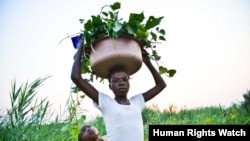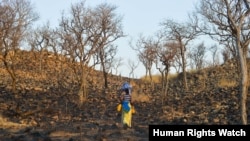MAPUTO —
Mozambique is poised for a natural resource boom on the back of huge coal and natural gas discoveries. But, new sources of wealth are often bad news for the communities living closest to where these resources are found. A new report from Human Rights Watch highlights the plight of more than 1,400 families who were moved to make way for Brazilian and Australian coal mining operations in the province of Tete.
Human Rights Watch says the Brazilian and Australian companies did build new homes for the displaced people in resettlement areas. But, it says, in many cases the people lost the ability to grow food and ended up relying on the foreign coal companies for handouts.
The scramble for coal in Tete province began in 2006 as Brazilian company Vale moved in followed by Australia's Rio Tinto and India's Jindal steel.
Human Rights Watch researcher Nisha Varia, who made three trips to the area in 2012, describes how the lives of peasant families living close to the Zambezi River were affected.
"Many of the people who were moved survived by farming and expected they would be able to do so when they were moved to the resettlement site," said Varia. "What happened is that the land where they were moved to is extremely dry and does not have access to the same water resources that many of them, not all of them, had before. One of the biggest problems is that they weren’t able to grow the crops that they were used to growing for their consumption."
One of the people Human Rights watch spoke to, Senolia Sayeni, had to move her family to make way for the Vale company mine.
The plot of land she was given in the resettlement area turned out to already belong to someone else.
“All I want is land to farm," she says, "because farming is the only way we know how to survive.”
In the face of these difficulties, Human Rights Watch warns, people’s frustrations are growing.
Nisha Varia says it comes as no surprise that resettled communities have increased their protests against Vale's mine.
"We encountered a lot of frustration and a bit of a sense of betrayal," said Varia. "I think people are frustrated because they are having to ask for help and assistance and many of them don’t want to do that. Many of them said we don’t want to be beggars. We want to have the means to support ourselves."
So why did Senolia Sayeni and her family end up so far from their original home close to the river when they were resettled?
Part of the problem, says Human Rights Watch, is that land is becoming incredibly scarce in Tete province as more and more of it is set aside for mining.
"The land that many of these communities said they selected for themselves," said Varia. "They proposed some sites - all of those sites were already in other mining licensed areas so the government wasn’t able to approve it. In Moatize district, 80 percent of the land has actually been taken up by mining licenses. People recognize this is now a problem but there aren’t a lot of options because the government has not planned effectively."
Close to three-and-a-half-million hectares of land is already allocated for mining in Tete province. When you add in licenses being processed, that is 60 percent of the province.
Human Rights Watch's Nisha Vaira says this resettlement dilemma will likely get worse as Mozambique gets ready to exploit, not only its coal resources, but vast natural gas finds in the north of the country.
She says the companies and the government of Mozambique must learn from their mistakes and the countries where the companies are based must uphold international human rights standards as they scramble for Mozambique's resources.
Human Rights Watch says the Brazilian and Australian companies did build new homes for the displaced people in resettlement areas. But, it says, in many cases the people lost the ability to grow food and ended up relying on the foreign coal companies for handouts.
The scramble for coal in Tete province began in 2006 as Brazilian company Vale moved in followed by Australia's Rio Tinto and India's Jindal steel.
Human Rights Watch researcher Nisha Varia, who made three trips to the area in 2012, describes how the lives of peasant families living close to the Zambezi River were affected.
"Many of the people who were moved survived by farming and expected they would be able to do so when they were moved to the resettlement site," said Varia. "What happened is that the land where they were moved to is extremely dry and does not have access to the same water resources that many of them, not all of them, had before. One of the biggest problems is that they weren’t able to grow the crops that they were used to growing for their consumption."
One of the people Human Rights watch spoke to, Senolia Sayeni, had to move her family to make way for the Vale company mine.
The plot of land she was given in the resettlement area turned out to already belong to someone else.
“All I want is land to farm," she says, "because farming is the only way we know how to survive.”
In the face of these difficulties, Human Rights Watch warns, people’s frustrations are growing.
Nisha Varia says it comes as no surprise that resettled communities have increased their protests against Vale's mine.
"We encountered a lot of frustration and a bit of a sense of betrayal," said Varia. "I think people are frustrated because they are having to ask for help and assistance and many of them don’t want to do that. Many of them said we don’t want to be beggars. We want to have the means to support ourselves."
So why did Senolia Sayeni and her family end up so far from their original home close to the river when they were resettled?
Part of the problem, says Human Rights Watch, is that land is becoming incredibly scarce in Tete province as more and more of it is set aside for mining.
"The land that many of these communities said they selected for themselves," said Varia. "They proposed some sites - all of those sites were already in other mining licensed areas so the government wasn’t able to approve it. In Moatize district, 80 percent of the land has actually been taken up by mining licenses. People recognize this is now a problem but there aren’t a lot of options because the government has not planned effectively."
Close to three-and-a-half-million hectares of land is already allocated for mining in Tete province. When you add in licenses being processed, that is 60 percent of the province.
Human Rights Watch's Nisha Vaira says this resettlement dilemma will likely get worse as Mozambique gets ready to exploit, not only its coal resources, but vast natural gas finds in the north of the country.
She says the companies and the government of Mozambique must learn from their mistakes and the countries where the companies are based must uphold international human rights standards as they scramble for Mozambique's resources.






